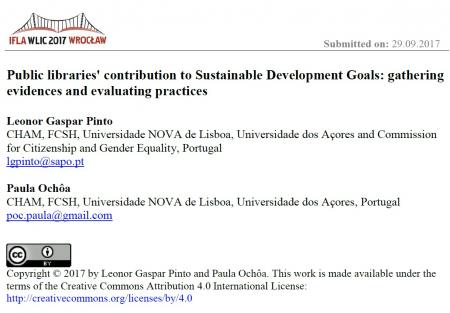ACTIONS
- Protect and safeguard cultural and natural heritage
- Learning and educational opportunities
- Cultural participation/social inclusion
- Sustainable tourism
- Support research
- Employment (recruiting, training, safety)
- Energy consumption, greenhouse gas emissions
- Waste management and reduction
- Transport (forms of, energy use)
- Commercial activities including copyright and IP
- Governance and management
- Security, disaster preparedness, risk reduction
- External partnerships and collaborations
- Publication/report
- Toolkit/framework/roadmap
Public libraries' contribution to Sustainable Development Goals: gathering evidences and evaluating practices
- L. G. Pinto and P. Ochôa, International Federation of Library Associations and Institutions (IFLA)
“The Project PLS aims to develop a Framework for Evaluating Public Libraries Contribution to SDGs and tailor it to Portuguese public libraries. As recommended by the report Worth their weight: an assessment of the evolving field of library valuation (Imholz & Arns, 2007), the project strategy intends to strengthen library advocacy efforts through evidence-based results and a comprehensive research agenda that promotes systematic valuation of libraries’ contributions, conceptual models and analytical tools to make a unified and full case for public libraries (Koufogiannakis & Brettle, 2016).
This paper aims to respond to these needs and, where possible, translate them into productive suggestions for future research and to ongoing strategies of evaluation alignment processes.”
Avaiable in
- English
SDGs LINKAGES
The focus of the resource is 12.6 (adopt sustainable practices and reporting), 17.19 (evaluation of sustainable development activity), as well as supporting effective, accountable and transparent institutions (SDG 16.6) and adopting policies for sustainable development (SDG 16.B).
The approach is illustrated with reference to SDGs 4.1 (primary and secondary education), 4.3 (equal access to vocational and tertiary education), 4.4 (skills for work) and 4.7 (Education for Sustainable Development).
Click on the SDG Target to discover Our Collections Matter indicators
-
Our Collections Matter indicators:
- Number of programmes drawing on collections that support children at risk of exclusion or otherwise not completing primary and secondary education.
-
Our Collections Matter indicators:
- Number of learning programmes in schools, colleges and universities that make use of collections.
- Proportion of learning programmes in schools and colleges making use of collections that prioritise disadvantaged areas.
- Gender balance of students in learning programmes.
- Number of programmes using collections that aim to encourage people to participate in education in schools, colleges and universities.
-
Our Collections Matter indicators:
- Number of young people and adults in skills-development activities and programmes drawing on collections, for employment, decent jobs and entrepreneurship.
- Increase in number of young people and adults in such programmes.
- Number and proportion of staff who have received training in the last year, to better support their contribution to the SDGs.
- Programs and processes in place to ensure the availability of a skilled workforce.
-
Our Collections Matter indicators:
- Numbers of people in each type of programme drawing on collections from different demographic groups.
- Increases in numbers of people in each type of programme from different demographic groups.
- Proportion of people involved in such programmes in relation to overall audience size.
- Evidence that learners have acquired knowledge and skills to promote sustainable development.
-
Our Collections Matter indicators:
- Clear visions, strategies and plans in place for all aspects of sustainability – environmental, social and economic (people, planet, prosperity)- across all areas of activity.
- Visions, strategies and plans relating to sustainability to be publicly available and incorporated into planning documents.
- Commitments to be in line with local, regional, national and/or international targets and ambitions.
- Incorporation of sustainability into reporting for funders and other stakeholders, including the public. Reporting to include commitments and progress towards targets.
-
Our Collections Matter indicators:
- Proportion of the population [audience/users/non-users] satisfied with their last experience of public services.
- Access to information, and accountability policies and mechanisms, in place.
- Effective institutional arrangements, both for own working and for working in partnership with other sectors, in place.
- Plans and arrangements in place for extraordinary circumstances such as natural and human-caused disasters.
- Effective arrangements in place to fulfil legal and social obligations and responsibilities.
- Effective arrangements in place for transparent communication and reporting of institutional performance.
- Effective arrangements in place for transparent decision-making and accountability.
-
Our Collections Matter indicators:
- Proportion of population [audience/users/non-users] reporting having personally felt discriminated against or harassed in the previous 12 months on the basis of a ground of discrimination prohibited under international human rights law.
- Number and proportion of policies that incorporate sustainable development considerations, in the full sense of recognizing all three of social, economic and environmental considerations.
-
Our Collections Matter indicators:
- Identification and implementation of measures for sustainable development incorporating social and environmental considerations.
- Identification and implementation of both quantitative and qualitative measures of sustainable development.

